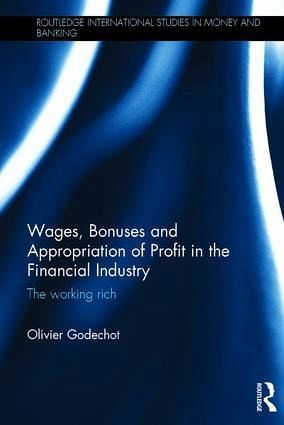
Wages, Bonuses and Appropriation of Profit in the Financial Industry
The Working Rich
Versandkostenfrei!
Versandfertig in über 4 Wochen
215,99 €
inkl. MwSt.

PAYBACK Punkte
108 °P sammeln!
The 2008 financial crisis led the whole world to ask questions of the financial industry. Why are wages in the financial industry so high? Are bonuses responsible for the financial crisis? Where do bonuses come from? Politicians and others urged people to believe that the crisis was the price of Wall Street's greed and blamed the "bonus culture" prevalent in the financial industry. However, despite widespread condemnation and the threat of tighter regulation, bonuses in the industry have proven remarkably resilient.Wages, Bonuses and Appropriation of Profit in the Financial Industry provides a...
The 2008 financial crisis led the whole world to ask questions of the financial industry. Why are wages in the financial industry so high? Are bonuses responsible for the financial crisis? Where do bonuses come from? Politicians and others urged people to believe that the crisis was the price of Wall Street's greed and blamed the "bonus culture" prevalent in the financial industry. However, despite widespread condemnation and the threat of tighter regulation, bonuses in the industry have proven remarkably resilient.
Wages, Bonuses and Appropriation of Profit in the Financial Industry provides an in-depth inquiry into the bonus system. Drawing on examples from France, the City and Wall Street, it explains how and why workers in the financial industry can receive such large bonuses. The book examines issues around incentives, morality and wealth-sharing among employees, including the rise of "the working rich" - those who have benefited the most from the high wages and large bonuses on offer to some employees. These people have achieved wealth through their work thanks to new forms of exploitation in our ever-more dematerialised economy. This book shows how the most mobile employees holding the most mobile assets can exploit the most immobile stakeholders. In a world where inequalities are rising sharply, this book is therefore an important study of one of the key contemporary issues.
It will be of vital interest to those studying finance, banking or political economy.
Wages, Bonuses and Appropriation of Profit in the Financial Industry provides an in-depth inquiry into the bonus system. Drawing on examples from France, the City and Wall Street, it explains how and why workers in the financial industry can receive such large bonuses. The book examines issues around incentives, morality and wealth-sharing among employees, including the rise of "the working rich" - those who have benefited the most from the high wages and large bonuses on offer to some employees. These people have achieved wealth through their work thanks to new forms of exploitation in our ever-more dematerialised economy. This book shows how the most mobile employees holding the most mobile assets can exploit the most immobile stakeholders. In a world where inequalities are rising sharply, this book is therefore an important study of one of the key contemporary issues.
It will be of vital interest to those studying finance, banking or political economy.












